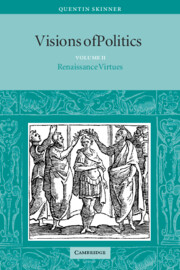Book contents
- Frontmatter
- Contents
- List of plates
- General preface
- Full contents: Volumes 1–3
- Acknowledgements
- Conventions
- 1 Introduction: The reality of the Renaissance
- 2 The rediscovery of republican values
- 3 Ambrogio Lorenzetti and the portrayal of virtuous government
- 4 Ambrogio Lorenzetti on the power and glory of republics
- 5 Republican virtues in an age of princes
- 6 Machiavelli on virtù and the maintenance of liberty
- 7 The idea of negative liberty: Machiavellian and modern perspectives
- 8 Thomas More's Utopia and the virtue of true nobility
- 9 Humanism, scholasticism and popular sovereignty
- 10 Moral ambiguity and the Renaissance art of eloquence
- 11 John Milton and the politics of slavery
- 12 Classical liberty, Renaissance translation and the English civil war
- 13 Augustan party politics and Renaissance constitutional thought
- 14 From the state of princes to the person of the state
- Bibliographies
- Index
- Plate section
14 - From the state of princes to the person of the state
Published online by Cambridge University Press: 05 September 2012
- Frontmatter
- Contents
- List of plates
- General preface
- Full contents: Volumes 1–3
- Acknowledgements
- Conventions
- 1 Introduction: The reality of the Renaissance
- 2 The rediscovery of republican values
- 3 Ambrogio Lorenzetti and the portrayal of virtuous government
- 4 Ambrogio Lorenzetti on the power and glory of republics
- 5 Republican virtues in an age of princes
- 6 Machiavelli on virtù and the maintenance of liberty
- 7 The idea of negative liberty: Machiavellian and modern perspectives
- 8 Thomas More's Utopia and the virtue of true nobility
- 9 Humanism, scholasticism and popular sovereignty
- 10 Moral ambiguity and the Renaissance art of eloquence
- 11 John Milton and the politics of slavery
- 12 Classical liberty, Renaissance translation and the English civil war
- 13 Augustan party politics and Renaissance constitutional thought
- 14 From the state of princes to the person of the state
- Bibliographies
- Index
- Plate section
Summary
The English translation of Thomas Hobbes's De Cive, first published in 1651, begins by promising to undertake ‘a more curious search into the rights of States, and duties of Subjects’. The Introduction to Leviathan, first published in the same year, similarly announces that the aim of the work will be to anatomise ‘that great LEVIATHAN, called a COMMON-WEALTH, or STATE’. Since that time, the idea that the confrontation between individuals and states furnishes the central topic of political theory has come to be almost universally accepted. This makes it easy to overlook the fact that, when Hobbes spoke in these terms, he was self-consciously setting a new agenda for the discipline he claimed to have invented, the discipline of political science. His suggestion that the duties of subjects are owed to an agency called the state, rather than to the person of a ruler, was still a relatively new and highly contentious one. So was his implied assumption that our duties are owed exclusively to the state, rather than to a multiplicity of jurisdictional authorities, local as well as national, ecclesiastical as well as civil in character. So, above all, was his use of the term state to denote this highest source of authority in matters of civil government.
Hobbes's declaration can thus be viewed as marking the end of one phase in the history of political theory and the beginning of another and more familiar one.
- Type
- Chapter
- Information
- Visions of Politics , pp. 368 - 413Publisher: Cambridge University PressPrint publication year: 2002
- 16
- Cited by

